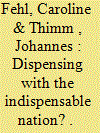| Srl | Item |
| 1 |
ID:
165904


|
|
|
|
|
| Summary/Abstract |
Since entering office, US president Trump has reversed key multilateral achievements of his predecessors, initiating a new US retreat from multilateral cooperation. For other governments wishing to preserve and deepen existing global agreements, this has posed the question of whether and how multilateral cooperation can work without the leadership and support of the dominant global power. International relations scholars have already debated the possibility of “nonhegemonic cooperation” in earlier periods marked by US unilateralism. This article draws on these previous analyses to evaluate the current prospects and limits of a “multilateralism minus one” in three key global policy areas: nuclear arms control, climate change, and trade.
|
|
|
|
|
|
|
|
|
|
|
|
|
|
|
|
| 2 |
ID:
054356


|
|
|
| 3 |
ID:
082703


|
|
|
|
|
| Publication |
2008.
|
| Summary/Abstract |
Scholars and commentators have long debated a `unilateralist' tendency in US foreign policy, but have largely neglected the question of how other states attempt to deal with the problem, particularly with increasing US opposition to multilateral treaty intiatives. This article describes and explains European responses to US unilateralism in three transatlantic conflicts over multilateral arms control agreements: the AntiPersonnel Landmines Ban, the UN Process on Small Arms, and the Biological Weapons Protocol. The article shows that European responses have varied between accommodation and resistance, and tests hypotheses about four potential determinants of European choices: expected treaty effectiveness, transatlantic rivalry, consensus norms, and the influence of non-government activists. The findings suggest that European responses reflect a strong concern for treaty effectiveness, but are also constrained by norms of consensual decision-making. Activist pressure can overcome this `compromise bias' of government diplomacy
|
|
|
|
|
|
|
|
|
|
|
|
|
|
|
|
| 4 |
ID:
135291


|
|
|
|
|
| Summary/Abstract |
IR scholars have recently paid increasing attention to unequal institutional orders in world politics, arguing that global governance institutions are deeply shaped by power inequalities among states. Yet, the literature still suffers from conceptual limitations and from a shortage of empirical work. The article addresses these shortcomings through a study of the historical evolution of global arms control institutions since 1945. It shows that in this important policy area, the global institutional order has not been marked by a recent trend toward deeper inequality, as many writings on unequal institutions suggest. Instead, the analysis reveals a pattern of institutional mutation whereby specific forms of institutional inequality are recurrently replaced and supplemented by new forms. This process, the article argues, is driven by states' efforts to adapt the regime to a changing material and normative environment within the constraints of past institutional legacies.
|
|
|
|
|
|
|
|
|
|
|
|
|
|
|
|